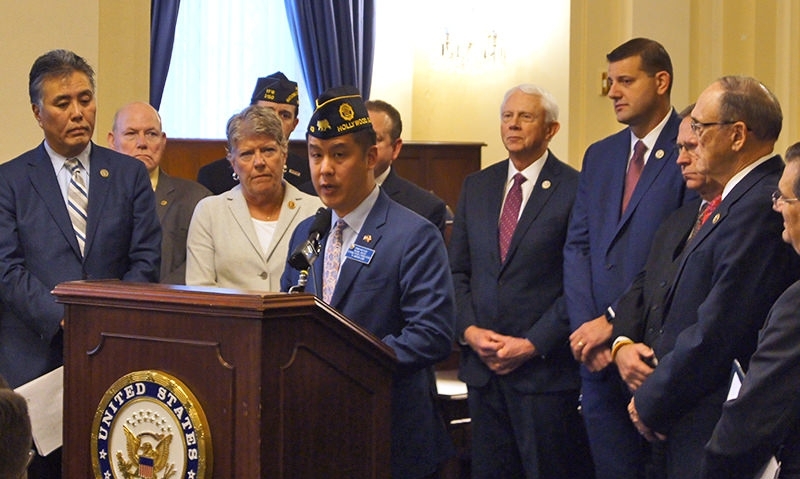
'A handfull' of senators stops Agent Orange benefits legislation that passed House unanimously.
Incoming House Committee on Veterans Affairs Chairman Mark Takano, D-Calif., promised in a bipartisan Dec. 20 press conference that the Blue Water Navy Vietnam Veterans Act will resurface early when the 116th Congress begins Jan. 3.
A top priority of the Republican he is replacing as chairman of the committee, Dr. Phil Roe of Tennessee, Takano said the measure – which affects some 90,000 Vietnam War veterans exposed to the toxic defoliant Agent Orange who served on surface ships during the war – will also be high on his agenda.
“We will keep working on the issue of toxic exposures,” Takano said at the conference, called by Roe in an effort to persuade a full floor vote in the waning days of the 115th Congress after the measure was blocked on Dec. 10 primarily by two senators who objected, one on the basis of cost and the other who questioned the science.
“I look forward to working with all my colleagues … to continue making this a priority,” Takano said.
The act passed the House by a 382-0 vote last June.
American Legion Veterans Affairs & Rehabilitation Division Director Chanin Nuntavong joined lawmakers and other veterans service organizations in a chorus of complaint that just two opponents in the Senate could sink the bill, which would restore Agent Orange-related benefits that were stripped away by administrative action in 2002.
“It is unfortunate to be standing here today under a massive cloud of disappointment,” Nuntavong said at the press conference. “The American Legion and our nearly 2 million members are extremely disappointed that this common-sense bill was not sent to President Trump, who promised so aggressively to take care of the men and women who have served our country.”
Nuntavong said The American Legion will continue to argue before Congress for the fair treatment of Blue Water Navy veterans, as he did last August in a Senate hearing when VA Under Secretary for Benefits Paul Lawrence voiced opposition claiming that “the science is not there.” Nuntavong made the point that the science debate should have been put to rest when the American Legion-supported Agent Orange Act of 1991 passed and subsequent changes were made to include other health conditions presumed to have been caused by exposure, regardless if it occurred on a ship or under a jungle canopy.
“It’s the right thing to do,” said Rep. Mike Bost, R-Ill. “This bill goes to the heart of those men and women who served.”
“For over three decades, we, as a legislative body, have tried to come to some resolution about how these men and women should be treated,” said Roe, who added that “it’s time to move past” debates over the connection between Agent Orange exposure and multiple cancers and other deadly illnesses which VA presumes to be service-connected only for Vietnam veterans who had boots on the ground during the war.
“We are not going to give up,” added Rep. Gus Bilirakis, R-Fla.
- Veterans Benefits

